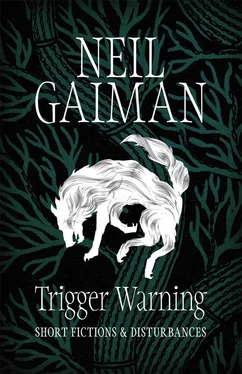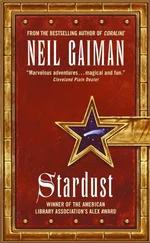Neil Gaiman - Trigger Warning - Short Fictions and Disturbances
Здесь есть возможность читать онлайн «Neil Gaiman - Trigger Warning - Short Fictions and Disturbances» весь текст электронной книги совершенно бесплатно (целиком полную версию без сокращений). В некоторых случаях можно слушать аудио, скачать через торрент в формате fb2 и присутствует краткое содержание. Год выпуска: 2015, Издательство: Headline, Жанр: Старинная литература, на английском языке. Описание произведения, (предисловие) а так же отзывы посетителей доступны на портале библиотеки ЛибКат.
- Название:Trigger Warning: Short Fictions and Disturbances
- Автор:
- Издательство:Headline
- Жанр:
- Год:2015
- ISBN:нет данных
- Рейтинг книги:4 / 5. Голосов: 1
-
Избранное:Добавить в избранное
- Отзывы:
-
Ваша оценка:
- 80
- 1
- 2
- 3
- 4
- 5
Trigger Warning: Short Fictions and Disturbances: краткое содержание, описание и аннотация
Предлагаем к чтению аннотацию, описание, краткое содержание или предисловие (зависит от того, что написал сам автор книги «Trigger Warning: Short Fictions and Disturbances»). Если вы не нашли необходимую информацию о книге — напишите в комментариях, мы постараемся отыскать её.
Trigger Warning: Short Fictions and Disturbances — читать онлайн бесплатно полную книгу (весь текст) целиком
Ниже представлен текст книги, разбитый по страницам. Система сохранения места последней прочитанной страницы, позволяет с удобством читать онлайн бесплатно книгу «Trigger Warning: Short Fictions and Disturbances», без необходимости каждый раз заново искать на чём Вы остановились. Поставьте закладку, и сможете в любой момент перейти на страницу, на которой закончили чтение.
Интервал:
Закладка:
‘Why do you not have gold?’ he asked me. His arm hung limply at his side.
‘There was no gold there for such as I,’ I said.
He threw himself forward, then, ran at me and kicked at me. My awl-blade went flying from my hand. I threw my arms around his leg, and I held on to him as together we hurtled off the mountainside.
His head was above me, and I saw triumph in it, and then I saw sky, and then the valley floor was above me and I was rising to meet it and then it was below me and I was falling to my death.
A jar and a bump, and now we were turning over and over on the side of the mountain, the world a dizzying whirligig of rock and pain and sky, and I knew I was a dead man, but still I clung to the leg of Calum MacInnes.
I saw a golden eagle in flight, but below me or above me I could no longer say. It was there, in the dawn sky, in the shattered fragments of time and perception, there in the pain. I was not afraid: there was no time and no space to be afraid in: no space in my mind and no space in my heart. I was falling through the sky, holding tightly to the leg of a man who was trying to kill me; we were crashing into rocks, scraping and bruising and then . . .
. . . we stopped.
Stopped with force enough that I felt myself jarred, and I was almost thrown off Calum MacInnes and to my death beneath. The side of the mountain had crumbled, there, long ago, sheared off, leaving a sheet of blank rock, as smooth and as featureless as glass. But that was below us. Where we were, there was a ledge, and on the ledge there was a miracle: stunted and twisted, high above the tree line, where no trees have any right to grow, was a twisted hawthorn tree, not much larger than a bush, although it was old. Its roots grew into the side of the mountain, and it was this hawthorn that had caught us in its grey arms.
I let go of the leg, clambered off Calum MacInnes’s body and onto the side of the mountain. I stood on the narrow ledge and looked down at the sheer drop. There was no way down from here. No way down at all.
I looked up. It might be possible, I thought, climbing slowly, with fortune on my side, to make it up that mountain. If it did not rain. If the wind was not too hungry. And what choice did I have? The only alternative was death.
A voice: ‘So. Will you leave me here to die, dwarf?’
I said nothing. I had nothing to say.
His eyes were open. He said, ‘I cannot move my right arm, since you stabbed it. I think I broke a leg in the fall. I cannot climb with you.’
I said, ‘I may succeed, or I may fail.’
‘You’ll make it. I’ve seen you climb. After you rescued me, crossing that waterfall. You went up those rocks like a squirrel going up a tree.’
I did not have his confidence in my climbing abilities.
He said, ‘Swear to me by all you hold holy. Swear by your king, who waits over the sea as he has since we drove his subjects from this land. Swear by the things you creatures hold dear – swear by shadows and eagle-feathers and by silence. Swear that you will come back for me.’
‘You know what I am?’ I said.
‘I know nothing,’ he said. ‘Only that I want to live.’
I thought. ‘I swear by these things,’ I told him. ‘By shadows and by eagle-feathers and by silence. I swear by green hills and standing stones. I will come back.’
‘I would have killed you,’ said the man in the hawthorn bush, and he said it with humour, as if it was the biggest joke that ever one man had told another. ‘I had planned to kill you, and take the gold back as my own.’
‘I know.’
His hair framed his face like a wolf-grey halo. There was red blood on his cheek where he had scraped it in the fall. ‘You could come back with ropes,’ he said. ‘My rope is still up there, by the cave mouth. But you’d need more than that.’
‘Yes,’ I said. ‘I will come back with ropes.’ I looked up at the rock above us, examined it as best I could. Sometimes good eyes mean the difference between life and death, if you are a climber. I saw where I would need to be as I went, the shape of my journey up the face of the mountain. I thought I could see the ledge outside the cave, from which we had fallen as we fought. I would head for there. Yes.
I blew on my hands, to dry the sweat before I began to climb. ‘I will come back for you,’ I said. ‘With ropes. I have sworn.’
‘When?’ he asked, and he closed his eyes.
‘In a year,’ I told him. ‘I will come here in a year.’
I began to climb. The man’s cries followed me as I stepped and crawled and squeezed and hauled myself up the side of that mountain, mingling with the cries of the great raptors; and they followed me back from the Misty Isle, with nothing to show for my pains and my time, and I will hear him screaming, at the edge of my mind, as I fall asleep or in the moments before I wake, until I die.
It did not rain, and the wind gusted and plucked at me, but did not throw me down. I climbed, and I climbed in safety.
When I reached the ledge the cave entrance seemed like a darker shadow in the noonday sun. I turned from it, turned my back on the mountain, and from the shadows that were already gathering in the cracks and the crevices and deep inside my skull, and I began my slow journey away from the Misty Isle. There were a hundred roads and a thousand paths that would take me back to my home in the lowlands, where my wife would be waiting.
My Last Landlady
My last landlady? She was nothing like you, nothing at all alike. Her rooms
were damp. The breakfasts were unpleasant: oily eggs
leathery sausages, a baked orange sludge of beans.
Her face could have curdled beans. She was not kind.
You strike me as a kind person. I hope your world is kind.
By which I mean, I’ve heard we see the world not as it is
but as we are. A saint sees a world of saints, a killer
sees only murderers and victims. I see the dead.
My landlady told me she would not willingly walk upon the beach
for it was littered with weapons: huge, hand-fitting rocks,
each ripe for striking. She only had a little money in her tiny purse,
she said, but they would take the notes, oily from her fingers,
and leave the purse tucked underneath a stone.
And the water, she would say: hold anyone
under, chill salt-water, grey and brown. Heavy as sin, all ready
to drag you away: children went like that so easily, in the sea,
when they were surplus to requirements or had learned
awkward facts they might be inclined to pass on
to those who would listen. There were
people on the West Pier the night it burned, she said.
The curtains were dusty lace, and blocked each town-grimed window.
Sea View: that was a laugh. The morning she saw me twitch
her curtains, to see if it was properly raining, she rapped my knuckles.
‘Mister Maroney,’ she said. ‘In this house,
we do not look at the sea through the windows. It brings
bad luck.’ She said, ‘People come to the beach to forget their problems.
It’s what we do. It’s what the English do. You chop your girlfriend up
because she’s pregnant and you’re worried what the wife would say
if she found out. Or you poison the banker you’re sleeping with,
for the insurance, marry a dozen men in a dozen little seaside towns.
Margate. Torquay. Lord love them, but why must they stand so still?’
When I asked her who, who stood so still, she told me
it was none of my beeswax, and to be sure to be out
of the house between midday and four, as the char was coming,
and I would be underfoot and in the way.
I’d been in that B & B for three weeks now, looking for permanent digs.
I paid in cash. The other guests were loveless folk on holiday,
Читать дальшеИнтервал:
Закладка:
Похожие книги на «Trigger Warning: Short Fictions and Disturbances»
Представляем Вашему вниманию похожие книги на «Trigger Warning: Short Fictions and Disturbances» списком для выбора. Мы отобрали схожую по названию и смыслу литературу в надежде предоставить читателям больше вариантов отыскать новые, интересные, ещё непрочитанные произведения.
Обсуждение, отзывы о книге «Trigger Warning: Short Fictions and Disturbances» и просто собственные мнения читателей. Оставьте ваши комментарии, напишите, что Вы думаете о произведении, его смысле или главных героях. Укажите что конкретно понравилось, а что нет, и почему Вы так считаете.







